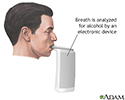Alcohol use disorder
Alcohol dependence; Alcohol abuse; Problem drinking; Drinking problem; Alcohol addiction; Alcoholism - alcohol use; Substance use - alcoholAlcohol use disorder is when your drinking causes serious problems in your life, yet you keep drinking. You may also need more and more alcohol to feel drunk. Stopping suddenly may cause withdrawal symptoms.
The Basics
Tests for Alcohol abuse
Bipolar disorder - Animation
Bipolar disorder
Animation
Attention deficit hyperactivity disorder (ADHD) - Animation
Attention deficit hyperactivity disorder (ADHD)
Animation
Depression - Animation
Depression
Animation
Alcoholic liver disease - Animation
Alcoholic liver disease
Animation
Depression and men
Depression is less reported in the male population, but this may be caused by male tendency to mask emotional disorders with behavior such as alcohol abuse.
Depression and men
illustration
Breath alcohol test
The breath alcohol test measures the amount of alcohol in the blood by testing exhaled air. The test is performed by blowing into a breath machine 15 minutes after alcohol consumption. The test determines how much alcohol it takes to raise the blood-alcohol level to a dangerous level.
Breath alcohol test
illustration
Bipolar disorder - Animation
Bipolar disorder
Animation
Attention deficit hyperactivity disorder (ADHD) - Animation
Attention deficit hyperactivity disorder (ADHD)
Animation
Depression - Animation
Depression
Animation
Alcoholic liver disease - Animation
Alcoholic liver disease
Animation
Depression and men
Depression is less reported in the male population, but this may be caused by male tendency to mask emotional disorders with behavior such as alcohol abuse.
Depression and men
illustration
Breath alcohol test
The breath alcohol test measures the amount of alcohol in the blood by testing exhaled air. The test is performed by blowing into a breath machine 15 minutes after alcohol consumption. The test determines how much alcohol it takes to raise the blood-alcohol level to a dangerous level.
Breath alcohol test
illustration
Alcohol use disorder
Alcohol dependence; Alcohol abuse; Problem drinking; Drinking problem; Alcohol addiction; Alcoholism - alcohol use; Substance use - alcoholAlcohol use disorder is when your drinking causes serious problems in your life, yet you keep drinking. You may also need more and more alcohol to feel drunk. Stopping suddenly may cause withdrawal symptoms.
The Basics
Tests for Alcohol abuse
Alcohol use disorder
Alcohol dependence; Alcohol abuse; Problem drinking; Drinking problem; Alcohol addiction; Alcoholism - alcohol use; Substance use - alcoholAlcohol use disorder is when your drinking causes serious problems in your life, yet you keep drinking. You may also need more and more alcohol to feel drunk. Stopping suddenly may cause withdrawal symptoms.
The Basics
Tests for Alcohol abuse
Review Date: 5/10/2023
Reviewed By: Fred K. Berger, MD, addiction and forensic psychiatrist, Scripps Memorial Hospital, La Jolla, CA. Also reviewed by David C. Dugdale, MD, Medical Director, Brenda Conaway, Editorial Director, and the A.D.A.M. Editorial team.






